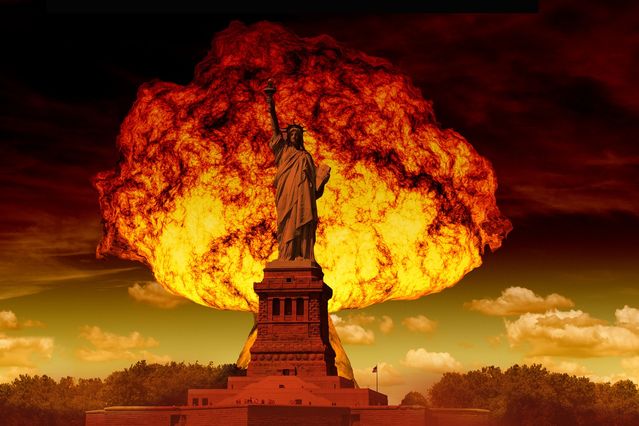Media
'End Times' Beliefs Are Extreme, and Extremely Influential
Apocalyptic views are shaping policy at the highest levels.
Posted December 12, 2017

To those who don't circulate in fundamentalist religious crowds, apocalyptic thinking—the belief that the world will soon be coming to an end, fulfilling biblical prophecy—might seem strangely fringe and hardly worth serious attention. Perhaps for this reason, the topic rarely gets much consideration in mainstream press. But it would be a mistake to be dismissive of “End Times” beliefs, because their influence in American policymaking is far from marginal.
A case in point is the recent declaration by President Trump to recognize Jerusalem as the capital of Israel. Though it was reported in the media that this move was intended to appease Trump’s conservative Christian base, few news accounts explained in any detail why the religious right considers the issue so important. Their motivation is not any desire to promote peace in the turbulent region, but in fact, the exact opposite: they sincerely believe the move will hasten the end of the world.
Robert Jeffress, a high-profile evangelical leader, praised Trump's decision, calling Jerusalem “the touchstone of prophecy.” The "prophecy" in question is the New Testament’s Book of Revelation, which depicts Jesus returning and an epic battle with forces of evil. Florida legislator Doug Broxson, while introducing Trump at a rally last week, couldn't contain his excitement over the policy change and its biblical implications: “I don’t know about you, but when I heard about Jerusalem – where the King of Kings [applause], where our soon-coming King is coming back to Jerusalem – it is because President Trump declared Jerusalem to be the capital of Israel.”
“Evangelicals are ecstatic” about the decision to recognize Jerusalem as the capital “for Israel to us is a sacred place,” explained pastor Paula White, who led the invocation at Trump’s inauguration. The restoration of Israel, along with various events incidental thereto, is seen as a necessary condition for the End Times.
Israel may be a Jewish state, but many fundamentalist Christians clearly feel they have their own theological skin in the game. Scriptural interpretations vary, but the End Times are generally understood by believers as the culmination of all of history, the climactic point where God’s promises are fulfilled, where the righteous are rewarded and God’s wrath is delivered to unrepentant sinners. And the role of Israel in all of this Christian prophecy is central.
This perceived importance is reflected in poll numbers comparing the views of white evangelicals and American Jews on the question of whether they believe God gave the land of Israel to the Jewish people: evangelicals hold the belief at a rate more than doubling that of Jews, 82 to 40 percent.
Although End Times are by definition apocalyptic, envisioning a war that ends the world, for many Christians it is an event to be welcomed, even hastened if at all possible. Such theology would be of little interest to most of us if those who held such beliefs were limited to isolated desert compounds. But as we see with the recent policy change on Jerusalem, End Times thinking is influencing policy at the highest levels.
And this is nothing new, for America has seen fundamentalism and biblical literalism influence everything from climate policy to the military. Despite all of this—with major clerics and even politicians openly discussing how they view the apocalypse with eager anticipation—it is rather strange that such thinking is not subjected to more open analysis and criticism in our media. One can only assume that this is due, at least in part, to the longstanding tradition of holding religious views to be immune from criticism or any serious scrutiny.
As a result, we see policies such as the change on Jerusalem, isolating the United States from the rest of the world, igniting turmoil in the Middle East and beyond, and undoubtedly setting off a chain of causation that will result in some kind of blowback, with almost no public discussion of the End Times theology fueling the move.
Should discussion of religion always be off limits? Even when theology is clearly shaping public policy? Is it wise to allow apocalyptic beliefs to influence contemporary policymaking? Given what is at stake, these are questions that should be front-and-center in our public dialogue, but instead, they are strangely absent.
If there is one kind of prophecy that even secular humanists believe, it is a self-fulfilling prophecy. For this reason, we should question those who read the Book of Revelation and say, “Bring it on!”




